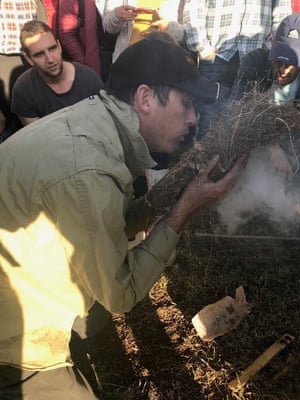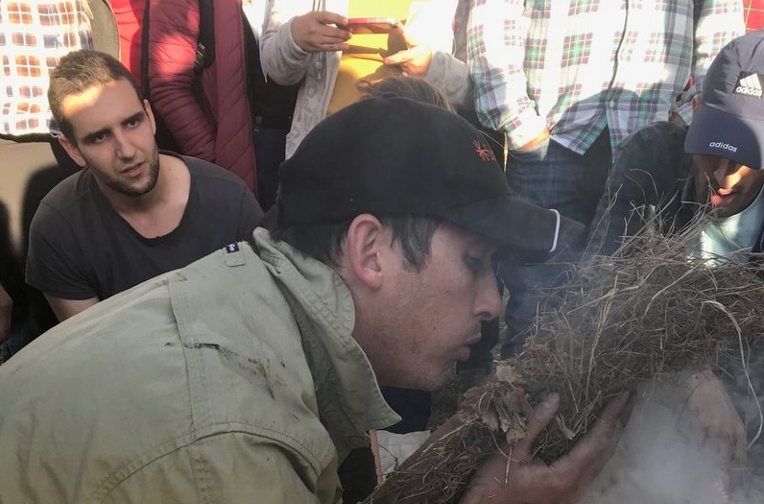We live in fire country as taught through fire lore, this is how I understand what is happening across country. These times are hard for us first peoples, so often we are ignored.
People all over the world are watching as we see what happens when you break lore on fire country. I always seek to acknowledge country and serve her lore.
Country is our mother, she provides everything. Our energy, protection, air, water, food, shelter, identity, cultural, spirit and so much more. It is important to respect country and give more then you take. It is our custom to share and be humble in our offerings to country. If we break lore, we lose our way and end up here like today.
A world on fire at the micro and the macro. These fires driven by mismanagement of country and climate change are a reflection of the impacts of colonisation on first peoples all over the world.
Every human has an ancestry that goes back to a holistic connection to the land. We need everyone to remember that feeling of connection and what it felt like to have it ripped away. I believe everyone has the opportunity to remember, if they decolonise their mind and set a path for a better way.
This way is the old way – it is custodianship, it is following your own path, guided by country.
Our ancestors managed this landscape for millennia and fire was one of our principle management tools. Through colonisation we have seen a rapid decline in our practices and, equally, a rapid decline in the values associated with this country.

Oliver Costello Photograph: Supplied
There are many culturally significant species and places that are under threat. It is really important that we establish appropriate cultural protocols and practices to be able to manage them, through local cultural authority and custodianship. An example is koalas — we call them budabe or burbi in our language. They are a really important dreaming story and totem for our country and many other communities.
It is really important that we understand the diversity of the responsibility that people take on and our role to support and protect them and remember, Budabe nga waybar jagun (Koala belong to fire country).
How Indigenous land burning is protecting rare mammals on Australia’s Tiwi Islands – video
When we talk about cultural fire, we are referring to the type of fire that is right for that land. As you walk through different landscapes the culture changes because the plants and animals, and the kinship of the land shifts. Fire is a critical part of managing country.
The problem is that we have seen an absence of Aboriginal cultural fire in the landscape and hazard reduction, no fire and wildfires have replaced it.
What we are not seeing is cultural fire for country and the right fire for country. The right fire for koala country is maintaining the health of the ecosystem. That includes protecting the canopy where the koalas live. Regenerating the tree that they eat.
When you practise fire the right way, it helps to reduce or stop the wildfires. They will still come but are not as bad as the wildfires we are seeing. If you burn the right way you will also get the next generations of food, habitat and trees. Fires are a critical part of koala country.
There is no doubt that climate change is making these fires worse.
No matter how we manage it, there would be a lot of fire in the landscape because there is a drying process and we are dealing with the effects of climate change. Our people managed the landscapes through changing climates for millennia but the degree of climate change we are seeing now is unprecedented.
Yet we can apply cultural knowledge and lore to this problem too. The knowledge is based on reading country – seasonal indicators and cues, and being able to adapt to the change and transition.
We are not talking about removing wildfire from the landscape. Wildfire is not a good term for me. A lot of the unplanned fires that happen in a landscape are lightning strikes which have their place in our lore.
If this country awakens to the need for a cultural fire regime – a mosaic across tenure, across the landscape, that actually has successional burning, every year, we are out there for months and months, young and old people out there burning country, walking their pathways, learning their stories, managing that land – when these fires happen, and they are going to keep happening, the behaviour of the fire will be far different to what we are witnessing now.
I would like to acknowledge all the people that helped shape my journey – too many to list here – but I would like to particularly thank my family and community for supporting me on this journey.
My partner, Layla, kids, Jali and Araluen, support me to live this journey every day. My mother and her husbands, in particular Billy Yalawanga, for sharing his vision and introducing me to cultural fire.
My journey would not have been possible without Victor Steffensen and Peta Marie Standley, supported by Dr Musgrave and Dr George, Kuku Thaypan elders who shared their stories to help drive the knowledge and practice along the east coast.





